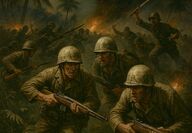Sorted by date Results 36 - 60 of 263

On the morning of September 10, 1963, in the heart of Alabama, a quiet yet earthshaking revolution unfolded. Twenty Black students, ranging from elementary to high school age, entered previously all-White public schools across several Alabama cities. Their steps echoed not only in the hallways of those schools but across the nation, marking a turning point in the struggle for civil rights and the ongoing battle to desegregate public education in the American South. Background: The Fight for...

U.S. Marines Hold the Line at Henderson Field in Pivotal Guadalcanal Clash GUADALCANAL, SOLOMON ISLANDS - September 12, 1942 Under the cover of moonlight and jungle canopy, the Battle of Edson's Ridge-also known as Bloody Ridge-erupted on Guadalcanal as Imperial Japanese Army forces launched a fierce assault against U.S. Marines defending Henderson Field. This brutal engagement marked a turning point in the Guadalcanal campaign and became one of the most heroic stands in Marine Corps history....

September 11, 2025 - LEEDS, AL - Today marks 24 years since the terrorist attacks of September 11, 2001-a day that forever altered the course of American history and left an indelible mark on the national conscience. Across Alabama and the nation, communities are gathering to honor the nearly 3,000 lives lost and the countless others forever changed by the events of that morning. At 8:46 a.m. Eastern Time, the first plane struck the North Tower of the World Trade Center. Seventeen minutes...

On August 29, 1833, the British Parliament passed one of the most transformative pieces of legislation in its history: the Slavery Abolition Act. This act marked the formal end of slavery in most parts of the British Empire, freeing more than 800,000 enslaved Africans across the Caribbean, South Africa, and Canada. Though the road to abolition was long and fraught with resistance, the act represented a monumental shift in moral, economic, and political thinking-and laid the groundwork for future...

The morning of September 11, 2001, started like any other Tuesday. People were heading to work, children were in school, and the sky was a clear, brilliant blue. But by the end of the day, the world had irrevocably changed. The coordinated terrorist attacks on the United States, carried out by 19 al-Qaeda hijackers, left an indelible mark on the nation and the world. Remembering 9/11 isn't just about recalling a tragic event; it's about honoring the victims, understanding the global shifts that...

In the waning years of the 4th century, the Roman Empire was fractured not just politically but spiritually. The Eastern Roman Emperor Theodosius I, a staunch Christian, faced off against Eugenius, a usurper backed by the powerful Frankish general Arbogast, who had seized control of the Western Empire after the suspicious death of Emperor Valentinian II in 392. Though Eugenius was not a pagan himself, his regime became a rallying point for Rome's traditional religious elites. Pagan temples were...

On September 5, 1914, the fate of France-and perhaps all of Europe-hung in the balance. German forces, executing the ambitious Schlieffen Plan, had swept through Belgium and northeastern France, pushing Allied troops into a desperate retreat. Paris was just 30 miles away from falling into enemy hands. But what unfolded over the next week would become one of the most pivotal moments in World War I: the First Battle of the Marne, a dramatic counteroffensive that halted the German advance and...

On September 4, 1996, Colombia's long-running internal conflict took a violent turn when the Revolutionary Armed Forces of Colombia (FARC) launched a coordinated attack on a military base in the southern department of Guaviare. The assault marked the beginning of a brutal three-week guerrilla campaign that left at least 130 Colombians dead. It was one of the deadliest escalations in the country's decades-long struggle with insurgency, drug trafficking, and political instability. The Attack and...

Although not an “abolitionist” in the strict sense, Abraham Lincoln opposed the expansion of slavery. Lincoln’s view was common within the Republican Party. Abolitionists were generally despised in both North and South--many would be considered radical even by today’s abysmal moral standards. Abolitionists, e.g., Wendell Phillips and Lysander Spooner routinely criticized Lincoln for his tepid anti-slavery views. Lincoln’s focus was on maintaining the geographical Union--slavery was a secondary...

World War II ended 80 years ago. But, before any peace dividend could be paid or the euphoria fully experienced, the Cold War started. Victory in the total defeat of the Third Reich and the Empire of Japan failed to usher in a new world order for peace, prosperity or universal rights. To the Russians, the defeat of the Nazis was not an end, but an opportunity to assert itself and insert an ideology that used peace as an opportunity for conquest. This shocked many in the West who believed Stalin...

On August 30, 1813, the quiet pine forests of southern Alabama erupted in violence as one of the bloodiest confrontations in early American frontier history unfolded-the Fort Mims massacre. This tragic event, which claimed the lives of hundreds of settlers, militia members, and allied Native Americans, marked a pivotal moment in the Creek War and reshaped the trajectory of U.S. expansion in the Southeast. Background: Tensions Within the Creek Nation The Creek War (1813–1814) was not merely a c...

In the opening month of World War I, as the Western Front descended into trench warfare, the Eastern Front erupted with sweeping maneuvers and dramatic reversals. Among the most decisive early engagements was the Battle of Tannenberg, fought between August 23 and 30, 1914, in East Prussia. It was here that the German Eighth Army, under the newly appointed command of General Paul von Hindenburg and his brilliant chief of staff Erich Ludendorff, orchestrated one of the most stunning encirclements...

On August 28, 1862, the quiet fields of Prince William County, Virginia, once again erupted into chaos as Union and Confederate forces collided in what would become one of the most consequential battles of the American Civil War: the Second Battle of Bull Run, also known as the Second Battle of Manassas. Fought over three days, this brutal engagement marked the culmination of Confederate General Robert E. Lee's Northern Virginia Campaign and set the stage for his first invasion of the North....

In the summer of 479 B.C., the rolling plains near the city of Plataea in Boeotia bore witness to one of the most decisive and symbolic battles of ancient history. On August 27, the allied Greek forces, led by Spartan commander Pausanias, routed the Persian army under General Mardonius, effectively ending the second Persian invasion of Greece and securing the future of Western civilization. Background: A Clash of Empires The Greco-Persian Wars had raged for decades, with Persia seeking to...

At precisely 11 a.m. on August 31, 1803, Meriwether Lewis stepped aboard a specially crafted keelboat and pushed off from the banks of the Ohio River in Pittsburgh, Pennsylvania. With that quiet but momentous launch, the Corps of Discovery began its epic journey westward-an expedition that would reshape the young United States' understanding of its vast, untamed interior. The Mission Behind the Journey Commissioned by President Thomas Jefferson shortly after the Louisiana Purchase, the Lewis...

On the morning of September 1, 1939, the world changed irrevocably. Adolf Hitler's Germany launched a brutal and calculated invasion of Poland, igniting the global conflict that would become World War II. For Alabama readers seeking to understand how distant decisions shaped the 20th century-and still echo in today's geopolitical tensions-this campaign offers a sobering case study in aggression, alliance, and the consequences of unchecked ambition. Prelude to War: Treaties and Tensions • Molotov...

On the morning of September 2, 1945, aboard the USS Missouri anchored in Tokyo Bay, the world witnessed the formal end of the most devastating conflict in human history. Representatives of the Allied powers and the Empire of Japan gathered to sign the Instrument of Surrender, bringing World War II to a solemn close. The ceremony was brief but monumental, not only in its diplomatic significance but in the emotional weight it carried for millions across the globe. Aboard the USS Missouri The...

September 3, 1650 - In the early morning mist near the coastal town of Dunbar, Scotland, the fate of two kingdoms hung in the balance. The Battle of Dunbar, fought between the English Parliamentarian forces under Oliver Cromwell and the Scottish army loyal to King Charles II, marked a turning point in the Third English Civil War and reshaped the political landscape of Britain for years to come. Background: A Kingdom Divided Following the execution of King Charles I in January 1649, England was...

On August 22, 2003 Alabama Chief Justice Roy Moore (R) was suspended from his role leading the Alabama judiciary because he refused a federal court to remove a rock inscribed with the Ten Commandments from the lobby of the Alabama Supreme Court Building. The unprecedented event sent shockwaves through legal, political, and religious communities across the country and has influenced the debate on both when, where and even if government is allowed to acknowledge God; and even if there are any cons...

On August 21, 1968, the Cold War's ideological fault lines cracked wide open as Soviet-led Warsaw Pact forces invaded Czechoslovakia, extinguishing the Prague Spring-a bold experiment in liberalization within the communist world. While tanks rolled through Prague and reformist leaders were detained, a stunning voice of dissent emerged from within the Eastern Bloc itself: Nicolae Ceaușescu, the authoritarian leader of Communist Romania, publicly condemned the invasion and called on his people...

August 18, 2008 - Islamabad, Pakistan - President Pervez Musharraf resigns under threat of impeachment Background: From Coup Leader to Embattled President Pervez Musharraf seized power in a bloodless coup on October 12, 1999, ousting Prime Minister Nawaz Sharif. Initially serving as Chief Executive, he later appointed himself President in 2001. His tenure was marked by: • Alignment with the U.S. in the post-9/11 "War on Terror" • Suspension of Pakistan's Constitution in November 2007 • Dismi...

On August 20, 1988, the guns finally fell silent along the 750-mile border between Iran and Iraq. After nearly eight years of one of the 20th century's most devastating conflicts, the two nations agreed to a United Nations-brokered ceasefire, marking the official end of the Iran-Iraq War. The truce, which came into effect at 7 a.m. Iraqi time, was hailed as a breakthrough in a war that had claimed over a million lives and reshaped the political landscape of the Middle East. A War Born of...

On August 19, 1944, the city of Paris erupted-not in celebration, but in defiance. After four years under Nazi occupation, Parisians rose up in a coordinated insurrection that would culminate in the liberation of their city just six days later. The uprising, supported by the advancing Allied forces, marked not only a strategic victory in World War II but a profound moment of national renewal for France. The Long Shadow of Occupation Since June 1940, Paris had been under German control. The...

On August 19, 1745, a red silken banner was raised at Glenfinnan, a remote Highland village nestled at the head of Loch Shiel. With that gesture, Prince Charles Edward Stuart-known to history as "Bonnie Prince Charlie"-launched the Second Jacobite Rebellion, a dramatic attempt to reclaim the British throne for his father, James Francis Edward Stuart. The moment marked the beginning of what would become one of the most romanticized and tragic uprisings in British history. But its consequences...

On August 22, 1910, the Empire of Japan formally annexed Korea through the signing of the Japan–Korea Annexation Treaty, marking the end of the Korean Empire and the beginning of a 35-year period of Japanese colonial rule. This moment, often referred to in Korea as "Gyeongsul Gukchi" (National Humiliation of the Year Gyeongsul), remains one of the most consequential and painful chapters in modern East Asian history. The treaty was signed by Ye Wan-yong, the pro-Japanese Prime Minister of K...